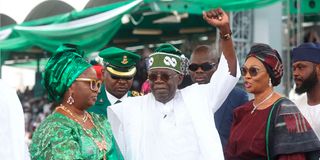Fear of mass dropout as Nigeria raises varsity fees

Bola Tinubu during his inauguration as Nigeria’s president in Abuja on May 29. Critics say he is not committed to improving university education funding.
The increase in tuition fees at public universities in Nigeria, which comes in the wake of the eight month strike by the Academic Staff Union of Universities (ASUU), means many students could abandon their studies.
Universities blame the rise of 100 to 200 per cent on inflation and little financial support by the government.
While efforts to award scholarships to students from poor backgrounds continue, many are uncertain about their future.
Intent on getting a degree, Agbaje Folohunsho embarked on a 1,392-kilometre journey from his town in the southwest to the University of Maiduguri in 2019. Folohunsho is a political science student.
For two years, he fit his studies around efforts to secure funds for tuition, transport and sustenance.
While scraping together the 18,000 Naira (about S$24) tuition fee to pay for his upcoming third year, plus a new phone to replace the one that was stolen, Folohunsho received an unsettling message from a friend: tuition fees had increased by 200 per cent. He now needed 75,000 Naira to continue his education.
“I was disappointed. The news came as a shock,” he said.
Despite lacking funds for necessities, Folohunsho resumed classes.
“I do not have enough money for food or transport. What I raised is inadequate to cover the higher tuition fees,” he said.
“My father insists that I continue my education, even though he has no means to provide the tuition fee. With the first-semester exam a week away, I am unable to pay the tuition fee.”
Samuel Ray, a third-year student at the University of Abuja, is in a similar situation.
Ray’s institution increased tuition fees by 200 per cent, leaving his family unable to cope.
“The decision on fee has affected most of my coursemates. Eighty per cent of students haven’t returned,” said Ray, a history education student.
Ray’s third-year tuition fee was initially set at 49,500 Naira but has soared to 108,500 Naira.
“It took more than a month to get the 49,500 Naira I paid in my second year. It is a frustrating. With hope in sight, dropping out of seems inevitable,” he said.
Despite months of negotiations between the ASUU and the federal government, an agreement has not been reached on many issues, including the funding of public universities.
In November last year, the National Bureau of Statistics (NBS) reported that inflation had risen to 21.47 per cent, the highest in 17 years.
Inflation and joblessness have combined to increase poverty levels. According to the NBS, more than half of Nigerians – approximately 133 million people – live in multidimensional poverty, and many are enrolled in the 43 public universities.
Hassan Soweto, the national coordinator of the Education Rights Campaign, expressed concern regarding the recent tuition fee rise.
He emphasised the urgent need for the government to allocate more resources to public education.
He, however, voiced scepticism about the commitment of Nigeria’s new President, Bola Tinubu, toward the issue.
Soweto criticised the student loan scheme Tinubu recently signed into law, stating that it would fail to alleviate the challenges poor learners face. (University World News).




